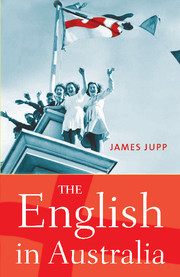Book contents
- Frontmatter
- Contents
- Illustrations
- Introduction
- 1 Who Were the English?
- 2 Convicts, Labourers and Servants
- 3 Farmers, Miners, Artisans and Unionists
- 4 Class and Equality
- 5 From Colonies to Commonwealth
- 6 Bringing Out Britons
- 7 The English Inheritance
- 8 The English as ‘Foreigners’
- Notes
- Further Reading
- Index
3 - Farmers, Miners, Artisans and Unionists
Published online by Cambridge University Press: 22 September 2009
- Frontmatter
- Contents
- Illustrations
- Introduction
- 1 Who Were the English?
- 2 Convicts, Labourers and Servants
- 3 Farmers, Miners, Artisans and Unionists
- 4 Class and Equality
- 5 From Colonies to Commonwealth
- 6 Bringing Out Britons
- 7 The English Inheritance
- 8 The English as ‘Foreigners’
- Notes
- Further Reading
- Index
Summary
Oh what a difference there is between this country and home for poor folks. I know I would not go back again – I know what England is. Old England is a fine place for the rich, but the Lord help the poor.
A woman from London to Caroline Chisholm, 1846, quoted in M. Kiddle, Caroline Chisholm, Melbourne University Press, 1990 (1950), p. 195The convict system was replaced by two methods of recruiting labour – free emigration and assisted passages. Free settlers were often able to finance themselves and their workers and dependants. They could secure land grants through the patronage system which was the basis of English politics. Frequently, land was acquired without any payment, especially in Western Australia. While settlement in New South Wales was initially confined, many moved outside the boundaries to become squatters, eventually consolidating their originally illegal hold on the land. The squatters were the equivalent of an upper class in colonial Australia but became the subject of criticism and land tenure reforms from the 1860s.
This method of settlement was not, of course, open to the average English immigrant. Many early families came with landowning farmers who saw better opportunities in the colonies. All land was held by the Crown and allocated to these pioneers either by sale or without cost. Land not taken up was treated as ‘waste land’ and remained with the Crown, much being later allocated on leases to pastoralists.
- Type
- Chapter
- Information
- The English in Australia , pp. 62 - 86Publisher: Cambridge University PressPrint publication year: 2004



